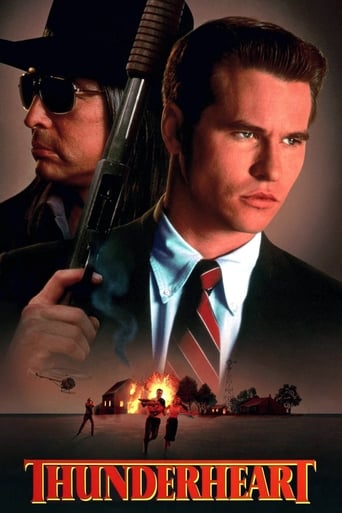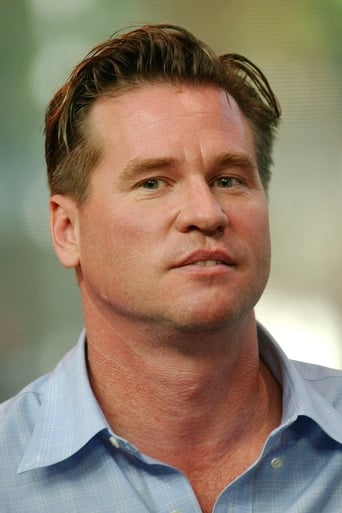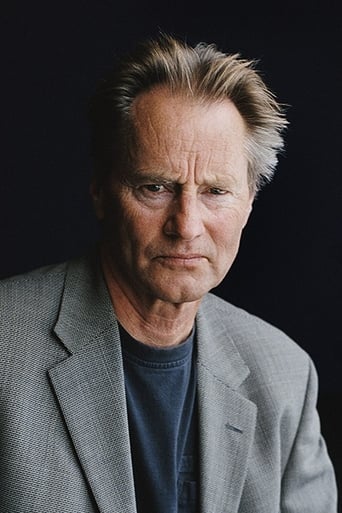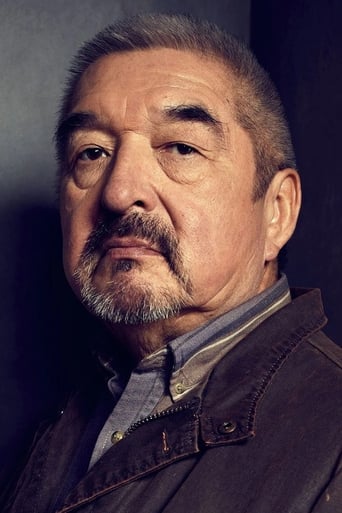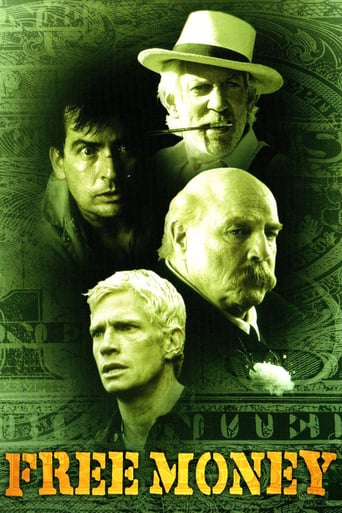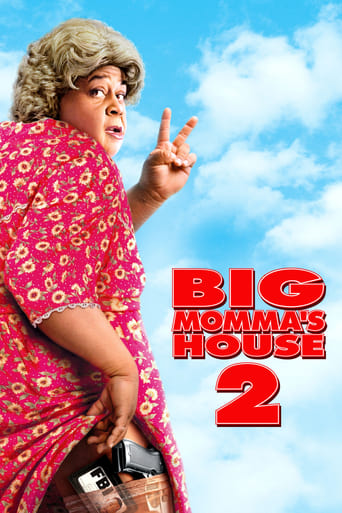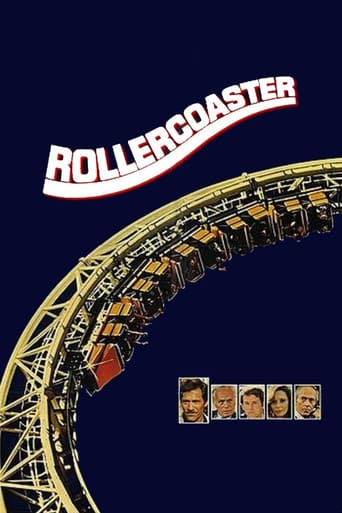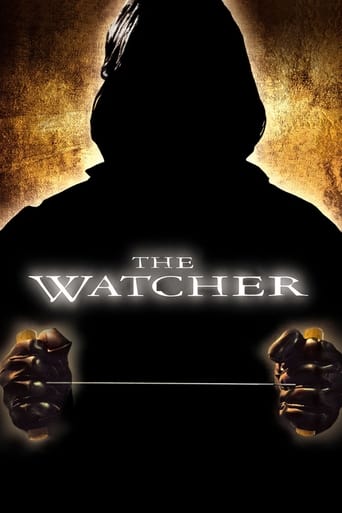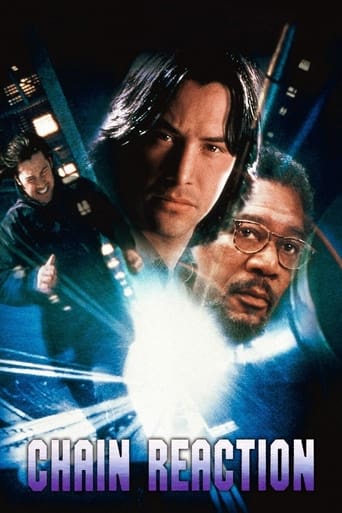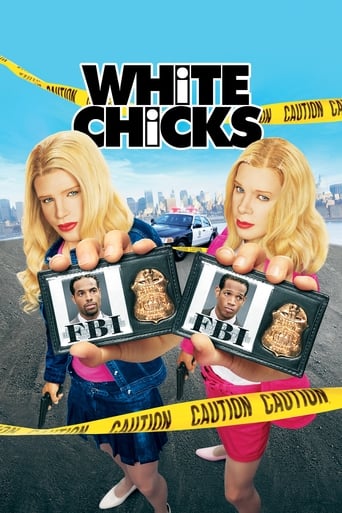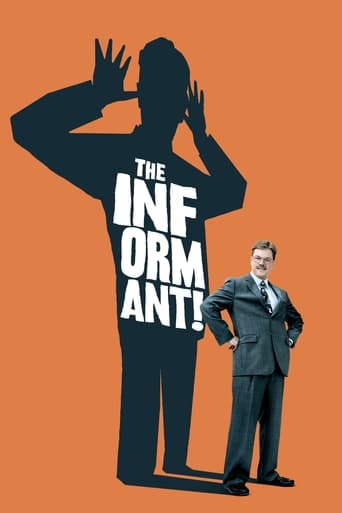Thunderheart (1992)
An FBI man with Sioux background is sent to a reservation to help with a murder investigation, where he has to come to terms with his heritage.
Watch Trailer
Cast
Similar titles
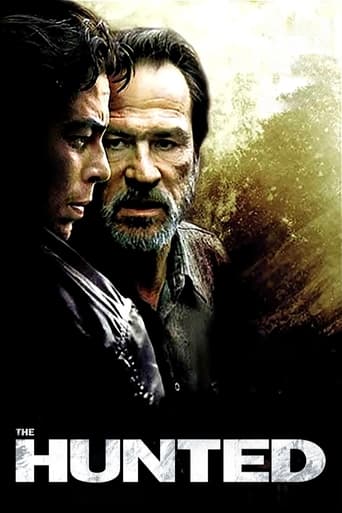

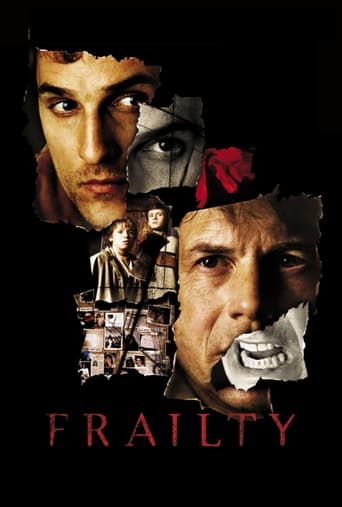
Reviews
Lack of good storyline.
If you don't like this, we can't be friends.
The plot isn't so bad, but the pace of storytelling is too slow which makes people bored. Certain moments are so obvious and unnecessary for the main plot. I would've fast-forwarded those moments if it was an online streaming. The ending looks like implying a sequel, not sure if this movie will get one
The story, direction, characters, and writing/dialogue is akin to taking a tranquilizer shot to the neck, but everything else was so well done.
"Nobody ever told us they were human." - Lt. Calley (My Lai hearings)An underrated thriller, Michael Apted's "Thunderheart" sees a young FBI agent (Val Kilmer) attempting to solve a series of murders on a South Dakotan Indian Reservation. The film was part of a wave of Hollywood pictures which attempted to delve into America's violent relationship with Native Americans ("Geronimo", "Dances With Wolves", "Last of the Mohicans", "Powwow Highway" etc).At its best, "Thunderheart" conveys well the way in which certain forms of violence echo through time and reverberate, loudly, in the present. Apted's Indian Reservations are run down, decrepit, and are at the mercy of modern "Colonialists", backed by the state. That a legacy of racist exploitation - racism is a key mechanism for the stabilization of capitalism and the legitimization of inequality - is alive and well in the present, is a lesson which our young FBI agent learns. Apted makes this most apparent during sequences in which car chases in the present are mirrored to military raids in the past, and in which the dead bodies of women echo the sand covered corpses of the Sioux and Cherokee. "They're a conquered people," one FBI agent says. "That means their future is dictated by the nation that conquered them." Unlike most films which uniformly "glorify" Native American Indians, "Thunderheart's" Indian Reservation is lorded over by different, warring sects. Some groups are fiercely "nationalist", some are well meaning, some are essentially power hungry dictators and others are beholden to the FBI, which for a long time ran illegal operations - offshoots of COINTELPRO - designed to disrupt Native Indian activists. "What makes you such a threat?" our hero asks one militant character. "We know the difference between the reality of freedom, and the illusion of freedom," comes the reply (from poet/activist John Trudell). "It's about power. They have to kill us because they cant break our spirit".Michael Apted's responsible for a number of documentaries, most notably "Up" and "Incident at Oglala", the latter also about deaths on an Indian Reservation. Like his best documentaries, "Thunderheart" is oft low-key, haunting and languid, though this tone frequently gives way to more heavyhanded brush-strokes: over-the-top violence, lots of "bad white man"/"good Indian" stereotypes, an overindulging in silly "spirtual/mythical" sequences and a generic last minute rescue. The film's climax, in which it is revealed that strip mining corporations are behind several murders, also reeks of "Chinatown", despite being a truth which occurs with frequency throughout history."Thunderheart" was shot by the renowned Roger Deakins. His aerial and night-time photography are excellent, the film's dialogue is often exceptional, and the film boasts fine performances by Graham Greene and Sam Shepard8.5/10 – Veers from powerful to cartoonish. See "Frozen River", "Lone Star" and "Hombre".
After reading some of the reviews posted here of Thunderheart, I am happy to see so many are positive. A few have posted the type of negative review I might have expected more of, that is, that the movie falsely criticizes the American Government of malfeasance and fraud.After seeing Thunderheart several times, I recognize many of the most controversial American Indian issues that have been interwoven into this parable that is set in South Dakota. It might be of interest to those who enjoy this movie exactly what those events were.ARM—Thunderheart centers around an activist Native American movement based on the real organization called AIM (American Indian Movement). President Richard Nixon was genuinely angry when AIM marched onto Washington in 1972 and forcefully, but without any injuries, occupied the Bureau of Indian Affairs. They were led by charismatic leaders such as Dennis Banks and Russell Means, and although their protests were not typically violent, Nixon made sure that they were treated like any other radical and violent organization of that era.GOONs—Fred Ward plays the character "Jack Milton," who is based on the Tribal Counsel President of the Pine Ridge Reservation, Dick Wilson (1934-1990). The name of his private police force, Guardians of the Oglala Nation (or GOONs) was apparently too good to change for the film. The violent acts by GOONs depicted in the film—roadblocks, shootings, and the secret murders of Wilson's political enemies—are all based on true events, for which Wilson was impeached in 1973, although reelected again in 1974. It is also mentioned in the film that GOONs was financed by misdirected money that was intended for humanitarian purposes on the reservation.Bear Creek Indian Reservation—This is a pseudonym for the Pine Ridge Indian Reservation.Two dead agents, "family men"—At one point, Cooch mentions two FBI agents who were killed. This is based on agents Ronald A. Williams and Jack R. Coler, who were killed by multiple gunshot wounds on June 26, 1975. A detailed depiction of this shootout, along with the story of Leonard Peltier, who was ultimately convicted of the double murder, is in Peter Matthiessen's book, In the Spirit of Crazy Horse.Jimmy Looks Twice—Ray asks Cooch if the mission they're on is a "mop up," in other words, he suspects that Cooch is just trying to pin the killing on anyone, just to close the matter for good. Peltier was charged along with three other AIM members in the brutal slaying of Agents Williams and Coler (only Peltier was eventually convicted and is still serving a life sentence). As explained in Matthiessen, the controversy surrounds the way the two agents were first wounded by gunshots from afar, and then "finished off" at close range. The case against Peltier and three other AIM members appears to be nothing more than the FBI railroading some of the more visible activists. Nonetheless, efforts to get Peltier a new trial or possibly even a pardon (as was imminent at the end of Clinton's Presidency) have been unsuccessful. Jimmy is played by John Trudell, a longstanding activist in AIM.Maggie Eagle Bear—Cooch scolds Ray by saying, "Now ARM people think she's an informant." Maggie is undoubtedly based on Anna Mae Pictou Aquash (1945-1975), who was a Micmac Indian (not Sioux) and never attended Dartmouth as Maggie did, but was a mother and AIM activist who was murdered under still mysterious circumstances. Cooch infers one of the theories, that AIM members killed her for being an FBI informant. Matthiessen suggests a scenario more akin to the movie, in which FBI agents might have even dragged their feet to identify her. The film also adds a second layer as a motive for the murder involving uranium mining which was contaminating the water.Richard Yellow Hawk—An agent provocateur in a wheelchair, Richard adds yet another layer to the plot, in that the FBI was planting its own agents into activist organizations like AIM to gather information and discredit them. Although the FBI program COINTELPRO was discontinued in 1971, parts of it did continue into the 1970s to monitor AIM.Red Deer Table—The issue of contaminated water due to uranium mining, or of strip-mining in general, is most prominent not on the Pine Ridge Reservation, but on the Hopi Reservation in Arizona. The mining companies, with the help of the Federal Government, invented a Navajo-Hopi Land Dispute, in order to move Navajo off of coal-enriched land so they could strip-mine it. That Cooch is motivated by the land deal adds this geographically remote Indian issue to this tale.Thunderheart—Although there are 146 people buried at Wounded Knee, history records that over 300 Lakota men, women and children were killed there on December 29, 1890 (as Grandpa Sam Reaches explains to Ray). The famous Sioux chief Sitting Bull was killed 14 days earlier. When Ray visits the Wounded Knee Monument, he reads "19. Thunderheart," the name of the Indian he is supposed to be the reincarnation of, as the 19th name listed in the mass grave. Actually, the 19th name on the monument, according to some photos on the Internet, is an Indian named Swift Bird.Above all, this film does not claim to be nonfiction. The opening disclaimer says: "This story was inspired by events that took place on several American Indian reservations during the 1970s." Recently, there has been a strong effort from the politically right to show that Peltier really was the close-range executioner of the two FBI agents and that Acquash was murdered by AIM members because she knew this. Although this bizarre version of events has all the twisted logic of Barack Obama's Kenyan birth certificate, it is being employed in a new trial against two AIM activists, John Graham and Richard Marshall. A third, homeless man, Fritz Arlo Looking Cloud, has already been convicted in 2004 for the murder of Acquash, and his strange testimony is being used against Graham and Marshall.
Loosely inspired by the so-called "Incident at Oglala", the killings of two FBI agents at the Pine Ridge Reservation in 1975, "Thunderheart" is a murder mystery, an action-thriller, and a window into Native American culture and beliefs. Val Kilmer in maybe his best performance, plays Ray Lavoi, an FBI agent sent to investigate a murder on a Native American reservation in upstate South Dakota. His superiors at the federal agency realize native American blood runs through his veins and decide he's the best choice to help conduct the investigation, believing that his Native American connection will help endear him with the locals to get the evidence they need to make their case. But the locals aren't fooled a bit, and they call him the "Washington Redskin". From the outset, Lavoi distances himself from his Native American heritage. He is paired with veteran field agent Frank "Cooch" Coutelle, played with equal realism by the incomparable Sam Shepherd, who simply wants to capture their prime suspect, build a case, and vamoose from the reservation land as quickly as possible. But things aren't quite as they seem.When Kilmer and Shepherd arrive on the scene, the reservation land is home to feuding gangs of local Native Americans who sport gas-guzzlers and rifles. And the FBI is already making a strong case against one of them, deciding that the murder is part of the on-going blood feud. The agents then meet Walter Crow Horse (Graham Greene), a reservation police officer and investigator who starts questioning the air-tight FBI case; he begins elucidating several aspects of the murder either missed or dismissed by the FBI. Kilmer is somewhat curious, but Shepherd dismisses him. At first Kilmer regards Greene as an adversary but as the film progresses, a friendship gradually emerges. However, when Kilmer meets Maggie Eagle Bear (Sheila Tousey), an Ivy League graduate who returned to the reservation to help educate her people, he learns there have been many more unsolved murders as a result of the blood feud. Which begs the question: why is the FBI involved in this particular case? Kilmer then meets the most interesting character of the film, "Grandpa Medicine Man" Samuel Reaches, played by a bona fide Rosebud Sioux Indian name of Ted Thin Elk who had seen very few movies during his lifetime before he was asked to play this role. Grandpa describes some prophetic visions he had received concerning Kilmer's arrival. Simultaneously, he tries to help Kilmer reconnect with his Native American heritage. Now Kilmer is caught between two worlds: his duties as a federal agent and to the FBI and the culture of the American Indians to which he is just beginning to rediscover. An outstanding and compelling movie from start to finish, with superb performances by all the main leads, particularly Shepherd, Kilmer, Greene, Tousey, and Fred Ward as the leader of the rival tribe. And a special acknowledgment to Ted Thin Elk as the Grandpa Medicine Man, who almost steals the show as the wise old Indian who also likes to watch Mr Magoo on television for philosophical reasons. (But look out, he also likes to trade for your valuables! Before you know it, you may have given up your $5000 Rolex Watch for a little rock!) This is just an incredibly underrated film and a quality you don't find in many of films of its type. If it were up to me, I would have nominated Ted Thin Elk for an Academy Award in the Best Supporting Actor category.
In 1992, director Michael Apted released two accounts of the American Indian Movement: there was the documentary "Incident at Oglala" about Leonard Peltier, and the feature film "Thunderheart", loosely based on the Leonard Peltier case. This one features the ancestrally Indian Val Kilmer as an ancestrally Indian FBI agent investigating events in Pine Ridge in the 1970s and getting more interested in his own indigenous heritage.If absolutely nothing else, this movie should call to mind the history of Native Americans. They discovered America, but we don't admit it because they didn't colonize the Americas for another country. The Indians have gallantly fought against terrorism since October 12, 1492, while we act as if terrorism only emanates from the Middle East. They're reduced to running casinos to stay alive. For the record, at least some Indians don't like the word "tribe", preferring "nation".All in all, I really recommend this movie. Also starring Sam Shepard, Graham Greene, Fred Ward, John Trudell and presidential candidate Fred Thompson (I would never expect a creep like him to star in a movie like this, but he did, and later starred in "Bury My Heart at Wounded Knee").
